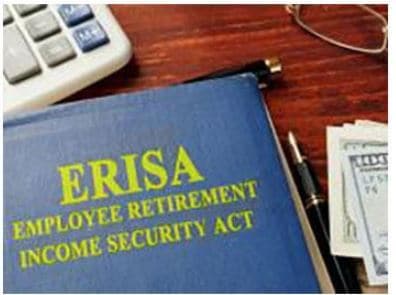
If you become disabled and are unable to work, you may need to file a claim for disability benefits. Your employer-provided disability insurance policy is probably governed by ERISA, the Employment Retirement Investment Security Act. ERISA protects participants and their beneficiaries in employee benefit plans. The legislation provides pension or insurance companies with guidelines on how to administer employee benefit plans, including disability and health plans. ERISA generally applies to the employee benefit plans of private employers of 20 employees or more, although it does not apply to federal or state government plans or to plans provided by churches to their employees.
 If you need to file a disability claim with your employer-provided disability insurance, it can be important to know how those benefits are determined. So, in this article we’ll first walk through the ERISA disability insurance claims and appeals process. Next, we’ll discuss things you should know about how disability benefits are determined. Finally, we’ll review the ERISA disability insurance appeal process.
If you need to file a disability claim with your employer-provided disability insurance, it can be important to know how those benefits are determined. So, in this article we’ll first walk through the ERISA disability insurance claims and appeals process. Next, we’ll discuss things you should know about how disability benefits are determined. Finally, we’ll review the ERISA disability insurance appeal process.
Filing an ERISA Disability Insurance Claim
When you are preparing to file an ERISA disability claim, there are a few things you need to do first: (1) obtain and read your policy and summary of benefits; (2) identify your date of disability; (3) carefully choose your last day of work after gathering medical evidence of your disability; (4) follow all of the deadlines, including appeal deadlines, outlined by your plan; and (5) get copies of your medical records.
Read the Policy
Before you file a claim, read your policy. Get a copy of the Summary of Benefits, as well as the policy itself, and become familiar with what is and isn’t covered under your plan. Under ERISA, your plan administrator must send you a copy of these documents if you request them in writing.
Identify the Date of Disability
Read your policy to determine how disability is defined. This can help you identify the date of your disability. All of your deadlines for filing a claim, and for appeals, will be determined by this date.
Choose Your Last Day of Work
The last day you worked is important to your claim. If you’re able, gather as many documents as possible that support your disability claim before you stop working.
Follow the Deadlines
Your policy will outline many of the deadlines you must meet for filing a claim. Make sure you closely follow these to avoid having a late claim summarily denied.
Get Copies of Your Medical Records
You need to know what your medical records say about your disability because the insurance company will review the same information to determine whether to allow or deny your claim. Your records should contain objective proof of your disability, like x-rays, lab tests, MRIs, or a Residual Functional Capacity form for depression or other mental illness.
For a free legal consultation, call (972) 535-6377
Determining Benefits
Once you’ve filed your initial disability claim, your plan provider will have 45 days to decide your claim, with a possible 30-day extension.If your insurance provider asks for additional information, you have 45 days to respond. Your provider should then make a determination within 30 days of receiving the additional information.
Defining “Disabled”
After receiving all the relevant information, your claim administrator will then look to your policy and your medical records to determine if you meet the definition of disabled. It’s important for you to understand how your policy defines “disabled.” Under some policies you may be considered disabled if you are unable to perform your current job. While other policies may only define you as disabled if you are unable to perform “any gainful occupation.”
Waiting Periods & Benefit Limitations
Many short and long-term disability policies have a waiting period for benefits. Short-term disability policies may only have a waiting period of a few days or a few weeks, but they only provide benefits for a few months. Short-term disability policies generally pay 80% of your salary.
Long-term disability policies may not kick in for anywhere from three to six months, after your short-term disability benefits expire, but last a much longer time period. As long as you are covered, long-term disability policies typically cover you up to the age of 65, or until your Social Security retirement age. These policies provide around 60% of your former salary.
Social Security Benefits
If you qualify for long-term disability benefits, your plan provider may require you to apply for Social Security disability benefits and then offset those benefits from the benefits paid to you by your insurance provider. Some insurance companies may even provide an attorney to help you file for these benefits.
Appealing an ERISA Disability Claim Denial
If your claim is denied, you have 180 days to appeal and it may be time to consult an attorney, if you haven’t already. Your appeal is the last shot you have at proving your claim. Now is the time to add medical evidence of your disability to the administrative record so it’s a good idea to consult a professional to ensure that you have the strongest appeal possible. Even if your appeal is denied, the stronger your appeal, the more likely it will succeed in federal court at a later time.
If you believe you’ve been wrongly denied disability benefits under ERISA, please call our toll-free number 844.UNDERWOOD (844.863.3796) or send us an email to arrange your free consultation with our lawyers. Se habla español.
Our McKinney, Texas law firm serves all of Dallas and Fort Worth, including Plano, Frisco, Allen and McKinney. Our Huntington, West Virginia attorney office serves all of West Virginia.
Call or text (972) 535-6377 or complete a Free Case Evaluation form





